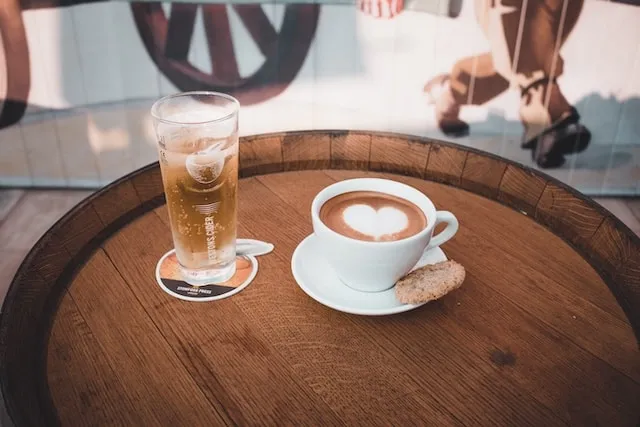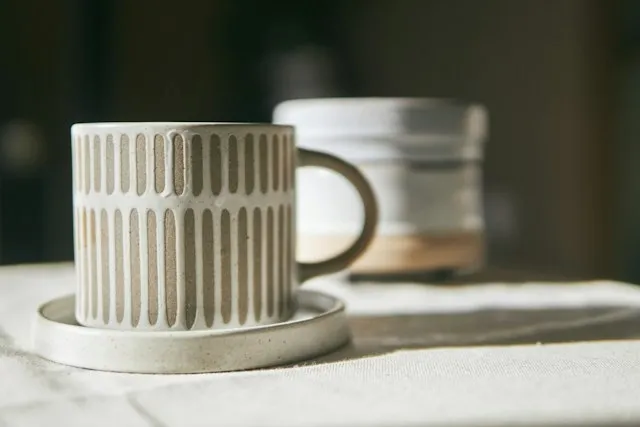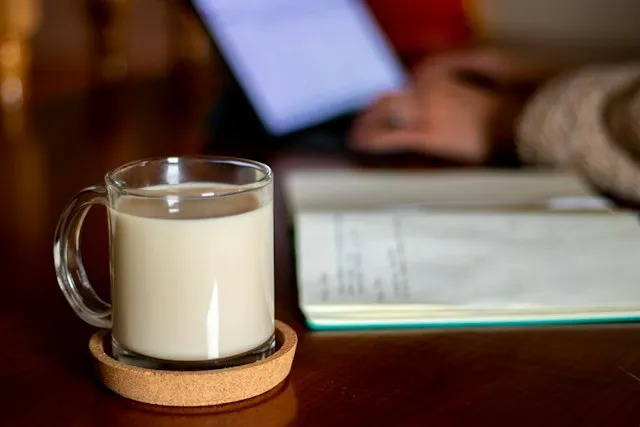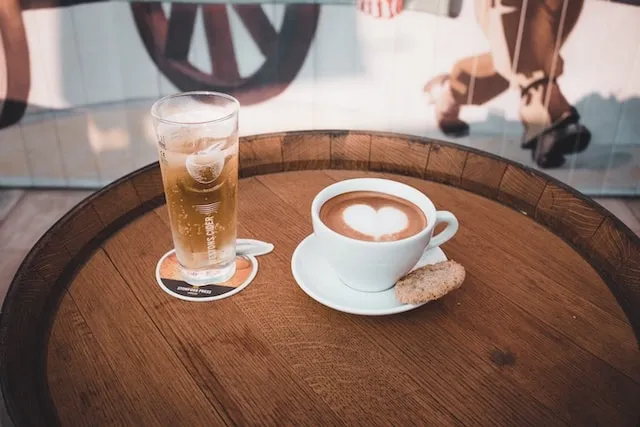Coaster Thickness: How Thick Should A Coaster Be?
Join us as we explore an important question for making or purchasing coasters: How thick should coasters be? Coaster thickness is an oft-overlooked but crucial aspect of coaster design. It has an impact on things like durability and aesthetics, so it’s important to have an understanding of the right thickness for a drink coaster. Uncover insights that go beyond the surface as we navigate the nuances of coaster dimensions, regardless of material. Tabletop protection should be a combination of resilience and style, and coaster depth is central to this.

Key Takeaways
- Coaster thickness tends to range between Ôàø inch up to ┬¢ inch or more, with different size ranges recommended for different materials.
- Paper beer mats can be as thin as around 1.2mm, while some ceramic or wooden coasters may exceed › inch for aesthetic reasons.
- Our custom coasters are available in a range of thicknesses and you get to choose the right one for you.
- Coaster thickness impacts heat resistance, moisture protection, and durability.
How Thick Is A Drink Coaster? In Mm And Inches
When we talk about coaster thickness, we are referring to the vertical dimensions or depth of a coaster. This is a key part of functionality and aesthetics, ensuring durability and maximum effectiveness against condensation and heat from beverages. An exploration of how thick a coaster should be depends on the material:
- Wooden coasters: The standard for wood is a thickness of ¼ inch to ½ inch (6-12mm), balancing sturdiness and elegance.
- Ceramic coasters: These are often a little thinner, ranging from ⅛ inch to ¼ inch (3-6mm) for a delicate profile.
- Cork coasters: With good absorbency, these often have a thickness of around ⅛ inch (3mm).
If you are looking to learn how thick a MDF coaster is, the range is similar. The same goes for slate, leather, and most other materials. The appropriate thickness contributes to a coaster's suitability for its purpose, and stylistic preferences can lead to different thicknesses.

Coaster Thickness Depending On The Materials
Now let’s take a closer look at how thick coasters should be depending on the coaster material. This is an important consideration if you are learning how to make a tea coaster, but also for people looking to buy coasters for their home or place of business.
There are no hard and fast rules for coaster thickness, but it is important to know that there is a delicate balance:
- Too thin, and a coaster may be breakable or ineffective as a barrier against spills and condensation.
- Too thick, and it may not be a sturdy surface on which to place your beverages.
How Thick Is A Wood Coaster?
What is the perfect thickness of a coaster made from wood? Well, they typically come in at around ¼ inch to ½ inch for a balance between stability and durability. At the lower end, you get sufficient sturdiness to withstand daily use and offer ample tabletop protection. At the higher end, you get enhanced durability for greater longevity from your coaster.
The natural aesthetic of wood is complemented by this thickness range, with the versatility to accommodate a number of wooden coaster design ideas. Choose the optimal wood coaster thickness to contribute to a functional and visually appealing tabletop accessory wherever you need it.
How Thick Is A Clay Coaster?
When talking about how thick a clay coaster should be, the most common depth is within a range of ⅛ inch to ¼ inch. This strikes a good balance between providing sufficient protection for your tabletops and maintaining a sleek, low-profile appearance. However, you may sometimes see ceramic coasters with a thickness of ½ inch for a different aesthetic.
A thickness of ⅛ inch keeps a ceramic coaster lightweight and provides effective moisture shielding. At ¼ inch or more, you have a more substantial feel without the coaster being too bulky. This thickness range allows for plenty of versatility in the design, meaning the aesthetic can vary without compromising the tabletop protection in any way.
Selecting the perfect thickness of a coaster ensures you get a harmonious blend of aesthetic appeal and functionality. Remember that coasters can play an integral role in table setting design.
How Thick Is A Cork Mat?
How thick should a cork coaster be? This is another material where coaster thickness usually falls within the range of ⅛ inch to ¼ inch. With this range, you have that all-important balance between lightweight design, durability, and effective tabletop protection. When you order custom cork coasters from us, you can choose from ⅛ inch (3mm) up to just under ½ inch, but you can also add an epoxy coating to increase the thickness and change the aesthetic and function.
The choice is between a slim and unobtrusive profile or a more durable coaster that looks a little more bulky. In either case, you get the excellent grip, absorbency, and rustic charm of cork for your coaster. The versatility of cork is what makes it a great coaster material, balancing style and performance with a range of coaster thickness options.
How Thick Is A MDF Coaster?
The perfect thickness for a MDF coaster, otherwise known as a fiberboard coaster, is the range of ⅛ inch to ¼ inch (3-6mm). MDF makes a great barrier against both condensation and heat, and this depth range balances sturdiness and a low-profile design.
The thinner option provides effective tabletop protection without too much bulk, which is great for a number of settings. Choose the slightly thicker option if you want a little more durability and a more substantial feel to the coaster. Either way, you can get an aesthetically-pleasing design, which can be customized if you choose us as your supplier.
We will provide accurate recreations of your design, and can accommodate bulk orders of any size for businesses. MDF is a reliable protector against tabletop threats, offering a versatile and modern solution.
How Thick Is Slate Mat?
The question of how thick slate coasters are comes down to the material itself. For the integrity of the material, a sturdy slate tile is usually around ¼ inch (6mm) thick. They can be thinner, but this is the recommended thickness for a durable product.
The natural durability and distinctive look of slate are attractive features, and it can produce an elegant aesthetic. At this recommended thickness, you get a sleek and lightweight design that offers abundant protection against moisture and heat. You can add another millimeter or so for additional durability - this is what we do for our stone coasters.
With this level of depth to your slate coaster, you will have a reliable and stylish addition to your tabletop. If you value a sophisticated look, choose this option with a full color imprint design added.
How Thick Is A Leather Coaster?
On the question of how thick a leather coaster should be, the depth usually ranges from 1/16 inch to ⅛ inch (2-3mm). A premium appearance and effective moisture resistance are attractive features of leather coasters.
At a thinner depth, these coasters have a sleek and minimalist design that still offers all the benefits of leather’s properties. The higher end of the leather coaster thickness range offers a little extra durability whilst still maintaining a slim profile and minimalist aesthetic. In this range, you have a good balance between a refined look and practical characteristics.
We offer the thicker option of a 3mm depth to ensure that your custom leather coaster remains resilient over time. With our high-quality debossed designs and diverse color options, you will have a sophisticated and reliable accessory for tabletop protection.
How Thick Is A Beer Mat?
A beer mat typically refers to a custom paper coaster, and these are usually created at a thickness of between 20 and 80 pt. These are disposable coasters, designed to absorb moisture and prevent water rings and other issues associated with condensation and spills.
This thickness range ensures a lightweight design and a slim profile, whilst providing a canvas to incorporate a custom design. Many bars, restaurants, and other venues use beer coasters for advertising or to incorporate other designs that engage the audience. The thickness makes a difference to this, as it plays a role in the effectiveness of the beer mat and how likely the user is to engage with it.
The coaster thickness range in question equates to around 1.2-1.5mm, and this is an industry standard for beer mats. They are an integral part of the drinking experience, so it is important that they look the part and perform their function well.

Want the aesthetic and practical benefits of wood coasters?
When you create custom wood coasters with us, you can determine your chosen thickness as well as the size, custom design, and more to fit your needs perfectly.
Are Custom Coasters Thicker Than Normal Ones?
Custom coasters come within the same thickness ranges as generic coasters. The difference is that, for many materials, you get to choose from a range of coaster thickness options to get the perfect solution for you. We provide various choices for how thick your coasters can be with materials like:
- Wood
- Ceramic
- Paper
- Cork
The full selection of materials we offer is staggering, and you can incorporate custom designs, choose your colors, select custom shapes, and more. Our results are always impressive, with high-resolution recreations of your design and the option to save money by placing a bulk order.
Custom coasters are the ideal solution when you want to match your decor and get reliable protection for your tabletops.
How Coaster Thickness Affects Use
The thickness of a coaster makes a significant difference to its functionality. Thinner coasters tend to be lightweight and versatile, offering good tabletop protection and a slimline profile. With a more substantial coaster thickness, you get more durability and enhanced protection for your tabletops. The aspects where this affects performance include:
- Heat protection
- Moisture resistance
- Longevity
Let’s take a closer look at the specific performance characteristics and the ways they are affected by how thick coasters are.
Heat Transfer
You need a coaster for a hot drink because tabletops can be damaged by prolonged exposure to high temperatures. Naturally, thicker coasters offer a more robust protection against heat. Those that are around ¼ inch thick offer better insulation than thinner ones, as the increased thickness creates a more substantial barrier.
Of course, material comes into play as well, and the materials that offer the best defense against heat include:
- Silicone
- Cork
- Slate
Heat resistance safeguards your surfaces and also gives a coaster greater longevity if it is frequently exposed to high heat. This is a practical consideration that forces you to consider functionality alongside the preservation of your tabletop aesthetics. For an enjoyable, worry-free experience with hot drinks, opt for a thicker coaster.
Absorption And Protection
Coaster thickness is a crucial consideration when it comes to moisture resistance and absorption. Thicker materials tend to be better at resisting moisture, particularly with absorbent materials like
- Paper
- Cork
- Stone
With a more substantial thickness, you get greater absorption capacity, preventing condensation and liquid spills from getting to the tabletop.
This is particularly important for delicate tabletops. Thicker absorbent coasters provide an effective barrier and are more durable than thinner ones. However, for non-absorbent materials, coaster thickness doesn’t play a huge role in their effectiveness as a barrier. Size is a more important consideration, as you want to ensure moisture spills are not immediately transferred to the tabletop.
Durability And Longevity
Coaster thickness impacts durability. In any material, thicker coasters are likely to be more robust and resistant to wear and tear. Thickness means greater structural strength, so coasters with a more substantial depth are generally more resistant to:
- Cracks
- Chips
- Warping
This ensures superior longevity of the protective function. Thicker coasters are good for commercial environments where they are used more frequently and regularly cleaned. However, for more personal use, a slimline coaster may offer a more desirable aesthetic with no meaningful compromise on longevity due to the less frequent use.

Enjoy robust metal coasters with a slimline appearance
The strength of the material means our custom metal coasters can be slim and still offer excellent protection and stylish customization options for your table settings.
Start creating hereFrequently Asked Questions About The Thickness Of A Coaster
How Thick Is A Coaster In Mm?
Depending on the material, coaster thickness typically ranges from 3-12mm. Paper coasters are thinner, whilst some materials offer coasters that are up to 24mm thick.
What Is The Perfect Thickness Of A Coaster?
The ideal thickness of a coaster depends on your needs and preferences. Thinner looks more elegant and lightweight, whilst thicker offers greater protection and durability.
How Thick Should A Leather Coaster Be?
Leather coasters are usually 2-3mm thick. This ensures a slimline appearance that offers the protection and durability that the material is known for.